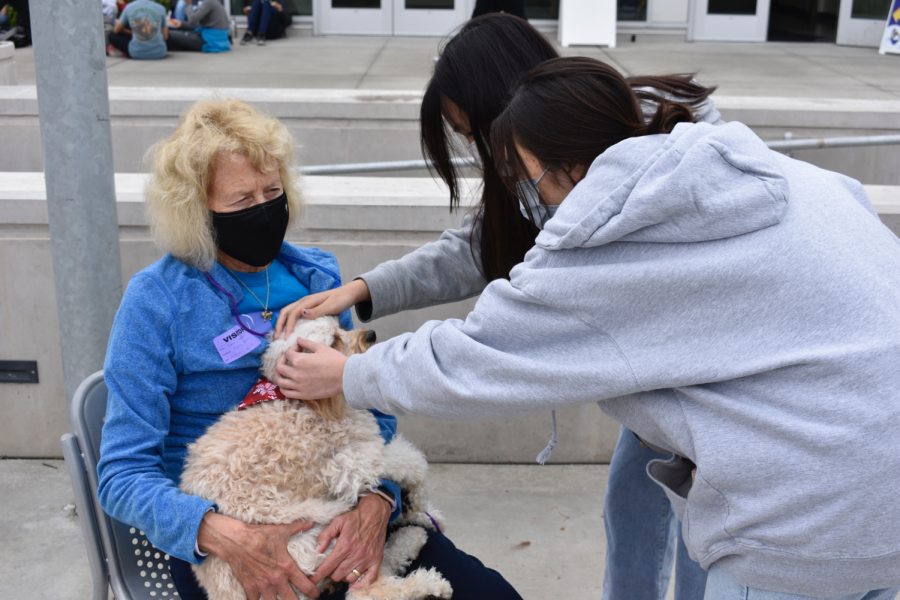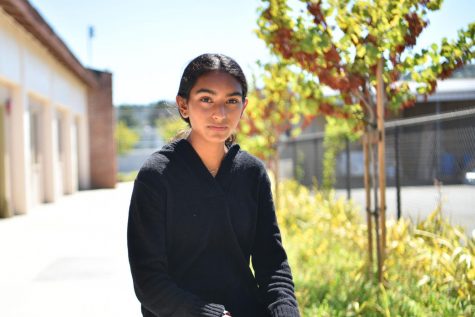Mental health awareness
Covering how mental health has changed and been addressed at MV in recent years
Students pet a dog during the Furry Friends event run by Bring Change 2 Mind before finals week.
April 28, 2022
Junior Vani Putheti has not always been open about her mental health struggles. Her mental health “tanked” during the COVID-19 lockdown and she was diagnosed for the first time with depression, anxiety and body dysmorphia. She began therapy in first semester of her sophomore year, after which she cycled through multiple therapists until she found the right fit for her.
As a result, Putheti has seen significant progress in her mental health over the last six months, enough to urge other teenagers who need help to also consider therapy. She often shares her experiences with others, and finds that the conversation surrounding mental health at MVHS has recently become more free-flowing, especially post-pandemic.
“People who may not have been as familiar with mental health problems have been forced to experience or confront their own mental health challenges [during quarantine],” Putheti said. “So I think the attitudes towards mental health have shifted a lot and there’s a lot less stigma. I’ve talked openly about mental health with people in my class[es] who I’m not super close with, but it’s just such a universal struggle that I think I can talk to anyone about it with little to no fear of judgment.”
Since the opening of in-person school, several clubs and initiatives with the goal of promoting awareness for mental health issues have reopened or begun. As a continuation of the practice that began in the fall of 2020, MVHS has held a monthly Advisory session e to practice social emotional learning and address important issues.
Clubs like Bring Change 2 Mind and Random Acts of Kindness allow students a space to focus on mental health challenges at MVHS. Bring Change 2 Mind hosted a Furry Friends event in December to help students de-stress before finals week by petting dogs on the Rally Court stage. Meanwhile, in the classroom, English teacher Vennessa Nava has hosted yoga sessions for her students at the beginning of class to implement mindfulness, and AP Physics 1 teacher Sushma Bana organizes Fun Fridays for students to take a break.
Bring Change 2 Mind President and senior Aishwarya Manoj describes experiencing difficulties transitioning back to in person learning, like many other clubs. Despite this, Manoj sees a real benefit from providing students a space to share and learn about mental health.
“I have seen that for members that really come out of their shell and push themselves to take part in our discussions, they tend to be the ones that keep coming back,” Manoj said. “Just the fact that people are attending is enough, and if they can take something from that and you can help them and encourage them to keep coming and learning more, then that’s good.”
School-based therapist Richard Prinz, who has been working at MVHS for 20 years, was initially hired as a “student advocate”, a title which was only recently changed to “school-based therapist.” According to Prinz, the initial title was meant to be less intimidating to students, and the change indicates reduced stigma surrounding seeking help. Like Putheti, he notices increasing conversation surrounding mental health and an increase in students seeking help.
Prinz also draws attention to the work of the Social Emotional Learning (SEL) task force at MVHS and the accompanying Advisory lessons. However, Putheti feels a disconnect between the support offered to students and the help that students actually need.
“The response I’ve seen from students to the faculty’s approach to mental health… like a band aid [solution],” Putheti said. “When we already have so much stress from school and other factors, to address it in this almost superficial way doesn’t seem like a very meaningful approach. Especially when we had an Advisory that took away one of our tutorials during finals week. That was pretty ironic because that made us all more stressed.”
Putheti places more importance in easing the workload of classes to combat mental health, while Prinz has a different approach to tackling mental health issues among the student body.
“My wish is that, like Physical Education, we had two years required for mental health,” Prinz said. “I wish it was in the curriculum. Then we could know that everyone is getting training in social emotional intelligence, everyone is getting the tools.”
Meanwhile, Manoj hopes to see a mental health panel established in a similar style to the GSA information panel that was presented to freshmen in 2019. Like Prinz, she wants mental health issues to be incorporated into the curriculum to clear up inaccuracies and misinformation surrounding the topic.
“Because people don’t take mental health issues very seriously, they don’t take the study of mental health issues very seriously,” Manoj said. “A lot of people think that they’ve become experts, even if they might not be a psychologist, but people act like they are just because they maybe read an article online. That can spread a lot of misinformation.”
Prinz points out another obstacle in spreading mental health awareness: trying to help students who may not want to be helped.
“It’s not always that a student initiates therapy, so that’s an obstacle if somebody doesn’t want to change,” Prinz said. “You know the joke about therapy in California, how many therapists does it take to change a lightbulb? It only takes one, but the lightbulb has to want to change.”
Putheti also strongly believes that a huge step in coping with mental health struggles can be opening up to others, and wants to normalize the idea of going to therapy. Above everything, she stresses the importance of students understanding mental health itself and how it can affect people, to be better equipped to manage it.
“Mental health is often compared to physical health,” Putheti said. “But I think one way it’s very different is that treating it takes a lot of time and it’s really not linear. Sometimes it comes in waves and it fluctuates, there’s highs and lows. Depression can wax and wane over time, but it is possible to overcome it in the long run.”





























